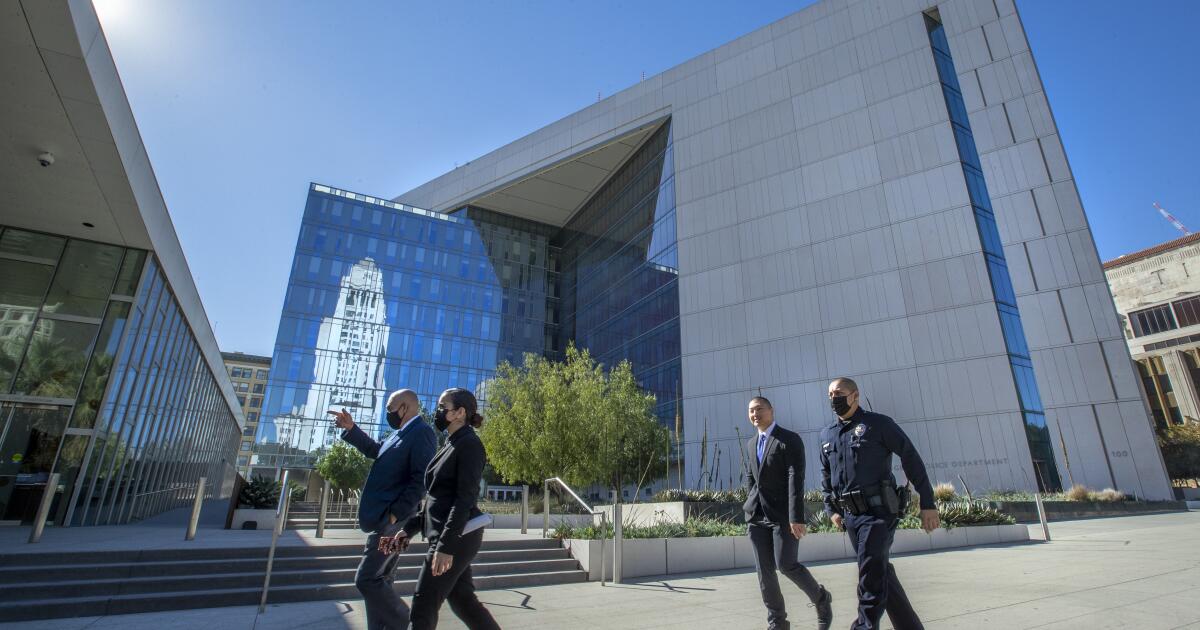The Los Angeles City Council on Tuesday approved a ballot measure giving the police chief the power to fire officers for certain serious misconduct, but stopped short of broader reforms to the LAPD disciplinary system that some had sought.
The City Council voted 11-2 in favor of sending the proposal to voters on the Nov. 5 ballot, with Councilman Hugo Soto Martinez and Councilman Eunises Hernandez opposed.
The vote was riddled with last-minute drama, with critics arguing that the plan would effectively create a two-tiered system for disciplining officers and allow the police chief to summarily fire some, but not all, problematic officers.
The council’s proposed plan would not only concentrate more power in the hands of the police chief, but would also eliminate an officer’s option to have their disciplinary actions reviewed solely by civilians, who tend to be more lenient in imposing discipline. The plan would allow officers to appeal their firings, which would then be brought before a new binding arbitration system.
Under the proposal, introduced by City Councilman Tim McCosker, the LAPD chief would have the power to fire officers who have engaged in misconduct, such as officers who belong to law enforcement gangs, officers who refuse to cooperate with a misconduct investigation, physical abuse, sexual assault, or various acts of discrimination.
Currently, officers found guilty of such misconduct can keep their jobs after going through a disciplinary board, but LAPD officials say the system is unusual and allows problematic officers to remain on the force.
Soto-Martinez in recent weeks has criticized a ballot proposal that would allow binding arbitration for officers challenging their firings or suspensions, pointing to studies and testimony from city and police leaders across the country that show the process typically favors the accused employee.
Soto-Martinez also argued that McCosker’s plan bears little resemblance to a proposal first introduced about 16 months ago and an earlier proposal passed by the Assembly’s Public Safety Committee. He warned that the changes would do little to change police accountability and would instead “further complicate” the disciplinary process.
“It’s going to cause more problems,” he said.
McCosker disputed that notion, saying the measure would actually reduce ambiguity.
“This language gives more clarity, not less clarity, because we now know the list of things that could trigger the summary termination of an officer by the police chief,” he said.
Council members Marqueece Harris-Dawson and Kevin de Leon were not present for Tuesday’s vote. Because the vote was not unanimous, the proposal will need a second vote next week, which is considered a formality.
Prior to 2017, the so-called rights committee was made up of two sworn commanders from the Los Angeles Police Department and one civilian.
In recent years, officers facing firing or long-term suspensions have had the option to opt into an all-civilian disciplinary board, which they have used almost exclusively since, according to LAPD data. The board’s proposal calls for a panel made up of a commander and two civilians.
With the Nov. 5 voting deadline looming, Tuesday’s meeting marked a point of no return in passing changes to the police system to weed out bad officers.
Soto-Martinez and other LAPD leaders worry that limiting the crimes that qualify for firing would weaken the chief’s power to fire officers who betray the public trust, even though officers, like many other public employees, can appeal their firings.
The Los Angeles Police Protective League, which represents rank-and-file officers, said the ballot language struck the “right balance,” preserving a civilian majority on the LAPD’s disciplinary board while allowing officers fired by the chief access to a binding arbitration appeals process.
Before they clashed a few weeks ago, Mr. McCosker and Mr. Soto-Martinez had worked together on LAPD reform efforts. The two seemed an odd pair, with Mr. Soto-Martinez a vocal critic of police spending and Mr. McCosker a former attorney for the Police Protective League.
By Tuesday, Soto-Martinez had voted against the final ballot language, saying it created too much ambiguity.
“As a responsible councillor I cannot come here and allow this to happen,” he said.
LAPD Deputy Chief Michael Rimkunas warned council members that if the proposal goes ahead in its current form, officers would not be able to directly fire officers who willfully refuse to comply with the terms of their employment. They also would not be able to summarily fire officers who are disqualified because they suffer from mental illness or are barred from possessing firearms, he said.
“This amendment will create two different regimes for similar misconduct, leading to confusion and inconsistent disciplinary outcomes,” Rimkunas said.
Pete White, founder and executive director of the advocacy group Los Angeles Community Action Network, said the police disciplinary system has “always been broken.”
He said human rights commissions tend to include lawyers, judges and former police officers, but not “victims of police violence.”
“So there was no confusion on our part that these were not so-called civilians representing victims of police violence.”
At the same time, prominent critics of the LAPD said they were wary of concentrating too much power in the hands of LAPD leaders, who in the past have not always shown a willingness to punish problematic officers.
“This system needs an overhaul, not just tinkering,” White said.

